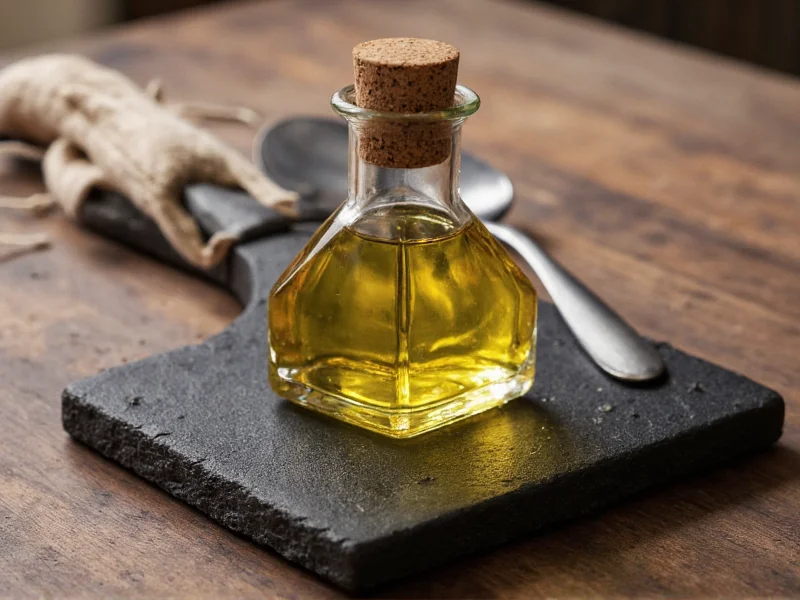When seasoning your Blackstone griddle, selecting the right oil matters significantly for creating a long-lasting non-stick surface. While flaxseed oil gained popularity for cast iron seasoning through viral online tutorials, its chemical properties make it problematic for Blackstone's specific steel composition. Understanding why requires examining both the oil's behavior and the griddle's material science.
The Science Behind Flaxseed Oil Seasoning
Flaxseed oil contains high levels of polyunsaturated fats, particularly alpha-linolenic acid (ALA), which polymerizes aggressively when heated. This rapid polymerization creates a hard coating that works reasonably well on traditional cast iron. However, Blackstone griddles use cold-rolled steel with different thermal expansion properties than cast iron.
During the seasoning process, flaxseed oil's low smoke point causes premature smoking before reaching optimal polymerization temperature for steel surfaces. The resulting coating often develops microscopic cracks as the steel expands and contracts during heating cycles. These cracks lead to the characteristic flaking that many Blackstone owners experience when using flaxseed oil.
Blackstone Griddle Material Considerations
Blackstone's cold-rolled steel cooking surface responds differently to seasoning than cast iron. The steel's smoother surface and different thermal conductivity require oils that polymerize at higher temperatures with more flexibility. Blackstone's official recommendations consistently suggest high smoke point oils rather than flaxseed for this precise reason.
Professional grill masters and experienced Blackstone users report that flaxseed oil seasoning typically lasts only 3-5 cooking sessions before requiring reapplication, compared to 10-15 sessions with properly applied high smoke point oils. The frequent reseasoning needed with flaxseed oil creates unnecessary maintenance and inconsistent cooking performance.
Comparing Seasoning Oil Options for Blackstone Griddles
| Oil Type | Smoke Point | Polymerization Quality | Blackstone Suitability | Recommended Layers |
|---|---|---|---|---|
| Flaxseed Oil | 225°F (107°C) | Brittle, prone to flaking | Poor | 3-4 (with frequent maintenance) |
| Canola Oil | 400°F (204°C) | Flexible, durable coating | Excellent | 2-3 (long-lasting) |
| Avocado Oil | 520°F (271°C) | Very durable, heat-resistant | Excellent | 2 (extremely durable) |
| Corn Oil | 450°F (232°C) | Good durability | Very Good | 2-3 |
| Sunflower Oil | 440°F (227°C) | Reliable, consistent results | Excellent | 2-3 |
Proper Seasoning Technique for Blackstone Griddles
For optimal results when seasoning your Blackstone griddle, follow these evidence-based steps using high smoke point oils:
- Clean thoroughly: Remove factory coating with soap and water, then dry completely
- Preheat: Heat griddle to 300°F (149°C) for 10 minutes to open steel pores
- Apply thin layer: Use paper towel to spread minimal oil across entire surface
- Heat gradually: Increase temperature to oil's smoke point (400-450°F) for 30-45 minutes
- Cool completely: Allow griddle to cool to room temperature before additional layers
- Repeat: Apply 2-3 total layers with proper cooling between applications
This method creates a flexible, durable polymerized layer that withstands Blackstone's thermal cycling. Unlike flaxseed oil seasoning which often requires weekly maintenance, properly applied high smoke point oil seasoning typically lasts through dozens of cooking sessions with proper care.
Maintenance Tips for Long-Lasting Seasoning
Maintaining your Blackstone griddle's seasoning requires consistent but straightforward practices:
- After cooking, clean while warm with scraper and minimal water
- Always dry completely before storing
- Apply thin oil layer after cleaning for storage protection
- Avoid acidic foods during initial seasoning phases
- Re-season when food starts sticking consistently
Many Blackstone owners mistakenly believe they need to season their griddle after every use. In reality, with proper high smoke point oil seasoning, maintenance seasoning is only necessary when performance noticeably declines - typically every 10-15 cooking sessions with regular care.
Why Flaxseed Oil Gained Popularity (And Why It's Misapplied)
The flaxseed oil seasoning trend originated from cast iron restoration communities where its aggressive polymerization created impressive results on traditional cast iron. However, this approach doesn't translate well to Blackstone's cold-rolled steel surfaces. The viral nature of "miracle" seasoning methods often overlooks material science differences between cookware types.
Understanding the specific requirements of your cooking surface - whether cast iron, carbon steel, or Blackstone's cold-rolled steel - is crucial for effective seasoning. What works for one material often creates problems for another due to differences in thermal expansion rates, surface porosity, and optimal polymerization temperatures.











 浙公网安备
33010002000092号
浙公网安备
33010002000092号 浙B2-20120091-4
浙B2-20120091-4